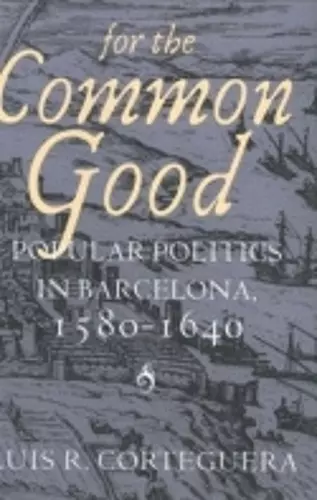For the Common Good
Popular Politics in Barcelona, 1580–1640
Format:Hardback
Publisher:Cornell University Press
Published:30th Apr '02
Currently unavailable, and unfortunately no date known when it will be back

On June 7, 1640, the viceroy of Catalonia was stabbed to death on a Barcelona beach. By Christmas, several more royal officials of the Spanish principality had been assassinated. In the wake of these and other violent acts committed by the "people"—a term used for artisans—the Catalans severed their allegiance to the Spanish monarchy and elected Louis XIII of France their new king. The first English-language book to explore the political beliefs and behavior of early modern craftsmen, Luis Corteguera's work offers a dramatically new account of the origins of the Catalan revolt, the longest rebellion in seventeenth-century Spain.Drawing on his extensive research in Barcelona's archives, Corteguera examines how the political actions, ideas, and language of Barcelona's craftsmen shaped the relations between the Spanish monarchy and Catalonia in the decades leading to the insurrection. Artisans made up over half of the population of Barcelona, the political center and largest city of Catalonia. The Mediterranean port had a long history of active popular politics. Artisans sat in the city council, formed the core of the principality's largest militia, and participated in protests and riots. Corteguera finds that the 1640 rebellion was not a social revolution of the poor but rather a political action by craftsmen seeking to defend what they perceived as the ancient liberties of their homeland. Although their behavior was more violent, the artisans were, the author asserts, motivated by the same assumptions, language, and symbols that inspired the elite of the principality.
Few authors have unraveled the knotted political skein of the common good better than has Luis Corteguera.
-- Donald J. Kagay, Albany State University * Sixteenth Century Journal *In this engaging study, Corteguera shows the 1640 rebellion to be a political action rather than social revolution in which the armies—despite a greater use of violence—had motivations parallel with those of the principality's elite.
* British Bulletin of Publications on Latin America, the Caribbean, Portugal, and Spain *The author of this fine book proposes to incorporate popular politics in the larger political history of early modern Europe by looking at Barcelona's popular politics during the sixty years before the outbreak of the Catalan Revolt. Corteguera focuses his research and analysis on the city's artisans, both male and female. This strategy alone makes the book distinct from previous studies of the revolt and leads Corteguera to a new and powerful conceptualization of popular politics.... This study of artisans provides a nuanced and convincing picture of the relationship between popular discontent and elite government, and establishes Corteguera as a major interpreter of popular politics in early modern Europe.
-- Helen Nader, University of Arizona * Journal of Interdisciplinary History *In sum, this is a finely researched, closely argued, and well-presented study that illuminates many aspects of the role of artisans in Barcelona during a period of crisis. It presents a perspective on the city's problems that historians have hitherto tended to neglect in favor of the central areas of dispute.
-- Henry Kamen * American Historical Review *Shifting the focus from political elites to the common people, this work examines the artisans who comprised more than half of Barcelona's 30–40,000 residents in the late sixteenth and early seventeenth century. Corteguera argues that the working classes in Barcelona shared a common political language and culture with the elites, Catalan and Castilian alike, who dominated the official institutions of early modern government. Popular politics was not simply mob rule, or a reaction to events in the highest circles of government.... Corteguera shows how this could happen peacefully, while the book as a whole demonstrates that the conversation between the people and elites took on an especially sharp edge whenever the threat of popular violence loomed over Barcelona.
-- Benjamin Ehlers, University of Georgia * European History Quarterly *Dorn's book is a gift to us. It is a model for combining analytical breadth and complexity and of using the particular to illuminate the general. It is now the best single-volume history of American higher education available.
* The Journal of American HistoISBN: 9780801437809
Dimensions: 229mm x 152mm x 24mm
Weight: 907g
256 pages